|
 WASHINGTON, D.C.—You've done what an outsider can do for Palestinian statehood; you've gone every extra mile. Your June 24, 2002 address was a magnificent gesture - offering the Palestinians a seat at the table of civilization despite the brutality of the war against Israel that was called the "second intifada." The lynching in Ramallah, the Dolphinarium bombing, the murder of infant Shalhevet Pass, the Passover Massacre, Matza Café and Sbarro Pizzeria bombings all came before your speech. But you - and the Israelis - were willing to let the past be past if only the future could be clean, transparent and peaceful. WASHINGTON, D.C.—You've done what an outsider can do for Palestinian statehood; you've gone every extra mile. Your June 24, 2002 address was a magnificent gesture - offering the Palestinians a seat at the table of civilization despite the brutality of the war against Israel that was called the "second intifada." The lynching in Ramallah, the Dolphinarium bombing, the murder of infant Shalhevet Pass, the Passover Massacre, Matza Café and Sbarro Pizzeria bombings all came before your speech. But you - and the Israelis - were willing to let the past be past if only the future could be clean, transparent and peaceful.
June 24th should have become a Palestinian national holiday. It was, however, just one more day in the life of Israel.
After your address came more attacks including a string of massive bus bombings - #841 at Karkur Junction, Jerusalem #20, Haifa #37, Jerusalem #14a, Jerusalem #18 and seven children on Jerusalem #2 - the bombing of the Maxim Restaurant, the point-blank execution of Tali Hatuel and her four young daughters, the Ashdod port bombing, the murder of bride-to-be Nava Applebaum and her father.
But the Israeli people did not allow themselves or their country to be defined by those who would murder them. Despite the war in Lebanon and the increasing number and range of Palestinian rockets rained into Israel from Gaza (something we sincerely hope you would never tolerate over an American border), Israelis have been busy building.
There was a baby boomlet nine months after the Lebanon war. Israel's GDP is close to par with Western Europe. Buffet, Gates and Trump are invested. Israel has free trade agreements with the EU, the United States, the European Free Trade Association, Turkey, Mexico, Canada, Jordan and Egypt. At the end of 2007, Israel became the first non-Latin American country to sign a free trade agreement with Mercosur, the regional organization of Brazil, Argentina, Uruguay and Paraguay. There are 90 Israel-related companies on NASDAQ. Israeli films won honors at the Sundance, Cannes and Shanghai festivals. Israel has taken in Darfur refugees and provided aid to earthquake victims in Peru and typhoon survivors in Bangladesh. Israel's very first UN General Assembly Resolution was to call on all members to share agricultural technology with developing countries. It passed 118 in favor with none opposed. Twenty-nine abstained including Egypt.**
In 2007, Palestinians killed 13 Israelis, down from 24 in 2006 and 50 in 2005. The "second intifada" is over, NOT because of your political, economic and military support of Palestinian independence. And NOT because of any change in the Palestinian determination to erase Israel; Hamas and Fatah are identical twins on the goal if not the means. It is over because of Israel's security fence, excellent intelligence and freedom of action in the West Bank.*
Israeli accomplishments under extreme duress should fill you with respect and the fact that Israelis are still willing to talk to you about Palestinian statehood should awe you.
So when you get to Israel, talk about Iran, talk about Iraq, talk about Venezuela. Talk about the violence in Pakistan as a result of our investment in a single leader and what that might mean to Egypt, Jordan, Syria and Saudi Arabia, as well as Abu Mazen. Talk about how you plan to encourage the deepening of civil society in the Muslim world.
But if you think you want to talk about what Israel can do to help the Palestinians achieve statehood, don't.
* Where the IDF recently seized 6.5 tons of potassium nitrate from a Palestinian truck at a security checkpoint. The truck's destination was in Gaza. The chemicals can be used to make explosives and to power Kassam rockets. The chemicals were in bags marked as humanitarian aid from the European Commission.
** Thank you HDS Greenway in The Boston Globe for some of this material.



Paroxysm - the National Election Begins
By Sheila Orysiek
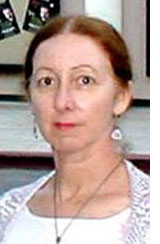 SAN DIEGO—January! This month a periodic paroxysm otherwise known as a national election begins in earnest in America. It is telling that most ordinary citizens don’t look forward to it - non-stop political advertising on TV, mud slinging, mis-statements, half truths, declamations and recantations. And, stereotyping. As Jews we know about stereotyping. We’ve been stereotyped as being a community of peddlers, beggars and vagrants while at the same time “all Jews are rich and rule the world” don’t-cha know. All of us have Mediterranean looks (dark hair and eyes), hooky noses and greasy hair. Never mind that Jews also look like Scandinavians, Ethiopians, Europeans and Asians. Facts don’t matter - that’s not what stereotyping is all about. SAN DIEGO—January! This month a periodic paroxysm otherwise known as a national election begins in earnest in America. It is telling that most ordinary citizens don’t look forward to it - non-stop political advertising on TV, mud slinging, mis-statements, half truths, declamations and recantations. And, stereotyping. As Jews we know about stereotyping. We’ve been stereotyped as being a community of peddlers, beggars and vagrants while at the same time “all Jews are rich and rule the world” don’t-cha know. All of us have Mediterranean looks (dark hair and eyes), hooky noses and greasy hair. Never mind that Jews also look like Scandinavians, Ethiopians, Europeans and Asians. Facts don’t matter - that’s not what stereotyping is all about.
This is also true of politics - what does truth have to do with stereotypes. elections or politics? Politics isn’t about truth or problem solving but
Sheila Orysiek
about the attempt of someone else to influence the perspective and response we each bring to the process.
Stereotyping ignores the reality that two intelligent well meaning people can look at the same facts and come to different conclusions as well as two political ideologies can look at the same problem and come to different conclusions. This doesn’t automatically mean either one is evil or illogical - but simply came to a different conclusion. Those on the right don’t come to their conclusions because they are inherently nasty and the left doesn’t come to their conclusions because they are inherently illogical. Both stereotypes are mythic.
This was brought home to me one day early in the 1980’s as I was watching on C-SPAN one of the most famous moments in the modern history of the United States Senate. The late Senator Daniel Patrick Moynihan (Democrat) - very liberal senator from New York - was speaking on the subject of the welfare system: the government’s Aid to Families with Dependent Children - about which he was considered an expert.
As he had been doing since 1965, he was again bringing to the nation’s attention the disastrous impact of welfare assistance on the cohesion of black families. He had a chart with one graph line tracing the rise of government welfare programs and another line tracing the rising number of single parent - out of wedlock - black children receiving this aid and how both graph lines matched. As the welfare payments had expanded so had the number of single parent black families.
He was understandably concerned about this societal catastrophe - children who never knew a father, living in homes empty of matrimonial commitment. He went on to delineate the cumulative effect of such households on society as a whole; crime, emotional loss, increasing demoralization, lack of positive role modeling and how this was bleeding over to succeeding generations. However, after making this very important connection - welfare payments and family disintegration - his conclusion surprised me - he wanted more welfare not less. He thought that a system about which he had just detailed its failures would be fixed with more of it. He didn’t want to change the program; he wanted to increase the program. I felt it was an illogical conclusion, but I would never stereotype him as being an illogical person.
While no one would contest the intellectual gifts of this man, and many would contend with any pretensions I might have - I dared to come to a different conclusion. A system with such failures needed to be reformulated - not ignored and not discontinued (and certainly not increased without change) - but rethought and restructured. Did the Senator’s conclusion make him a kinder hearted person than I? Did my conclusion make me a meaner person than he? And yet, when trying to have a national discussion about this, people who came to the same conclusion I did were all too often vilified and accosted personally rather than intellectually engaged. Epithets of “mean spirited” were flung about instead of engaging in constructive re-thinking of the problem.
This occurs on both sides of the political divide; attack the messenger rather than discuss the message. Stereotype the messenger, denigrate the mental process - rather than undertake to differ intellectually with the conclusion. While this kind of response is deplorable it is easy to understand why it happens. It is much easier to label, stereotype, or assume mental deficiencies in the other side than craft a constructive reasoned response.
The hallmarks of this kind of confrontation are easy to recognize: assigning stereotypical characteristics, assuming that because a person agrees with one political agenda item that stipulates agreement with an entire agenda and making declarative sentences demeaning the opponent and/or the message without putting forth constructive information.
Simply declaring that something is right - doesn’t make it so. And declaring that an opposing conclusion is wrong doesn’t make it wrong. Such declarations are empty of content. It is much more efficacious to discuss the conclusion and try to make it a better one. No one benefits from denigrating the messenger or a political opponent - everyone benefits from constructive solutions.
It is not possible that one side of the political divide is all knowing, all good and always correct. As soon as I hear one candidate - or a supporter of that candidate - demeaning and/or calling into question the mental capacities of the other side, it tells me something important about the accuser. It’s an arrogant cheap shot and I won’t cast my ballot for someone taking the easy road of cheap shots. What is said about one’s opponent says a great deal about the speaker.
A proverb teaches us that the best kind of help for someone who is hungry is to give them a fish for tonight and a fishing pole for tomorrow night. Teach them how to help themselves. The Rabbi says this is the highest form of tzedakah. The political conversation should be about how to do this rather than one half of the participants in the conversation demeaning the other half. This is important across the spectrum of the various problems we need to face and solve in our nation.
Demonizing, demoralizing, demeaning, denigrating, stereotyping - is not intelligent problem solving. And, this is precisely what I see as lacking in the election and political process as it unfolds both on the national level as well as across a coffee table. While the internet can facilitate good communication it can also be used for destructive purposes because insults can be flung about without having to look into the eyes of the person who is the target of the insults. The electorate is moved by mud because only mud is provided. This isn’t new - elections from the beginning were vicious.
Election campaigns are run with slogans and sound bites, problem solving is not. Taking an opponent’s statement out of context to further another’s political career is another cheap shot, not a contrasting of possible solutions to problems.
It’s far easier to react negatively than to react constructively. Much easier to simplistically declare the opponent wrong - or stupid - or blind - or mean - or illogical - than to take whatever is positive in the opposing viewpoint and build on it. Far easier to stereotype than to acknowledge divergent opinions are not automatically wrong - simply different.
Though we can’t individually change the national election process, we can as individuals participate on our own level - cleanly; not assuming the “other” is all wrong, all stupid and all evil. The “other” might have half an idea that when put together with our own idea - makes a better idea as a whole.
As we begin this year to the national election and the politics beyond it might be useful to remember a Yiddish proverb:
“Ven ale mentshn zoln tsien oyf eyn zayt, volt zikh di velt ibergeskert” - which translates as:
“If everyone pulled in one direction, the world would keel over.”


LETTER FROM JERUSALEM
Pay no heed to 'junk' on the Internet
By Ira Sharkansky
 JERUSALEM—Every once in a while I feel it necessary to clean out my electronic cupboard labeled "Jewish Junk." It is there that I file material far to the right or the left. Usually I glance without reading closely, in order to keep my blood pressure at levels that daily pills can control. Some of it so ridiculous as to be funny. Some of it may be dangerous, insofar as it can incite extremes to the point where no accommodation with Palestinians or others is possible. JERUSALEM—Every once in a while I feel it necessary to clean out my electronic cupboard labeled "Jewish Junk." It is there that I file material far to the right or the left. Usually I glance without reading closely, in order to keep my blood pressure at levels that daily pills can control. Some of it so ridiculous as to be funny. Some of it may be dangerous, insofar as it can incite extremes to the point where no accommodation with Palestinians or others is possible.
Ira Sharkansky
In the sub-category of the ridiculous is a circular that I received several times, beginning about a year ago. Its message was that educational authorities of the United Kingdom had removed teaching about the Holocaust from schools through the country, due to pressure from Muslims. The authors urged that their circular be passed on to the entire address book of all recipients. Only in this way could we deal with this latest threat to the Jewish people. Googling revealed that this was a myth. A few local schools had bowed to such pressure, but no such policy had been taken across the United Kingdom. The vast majority of British children were still learning about the Holocaust.
The panic apparent in the letter about the UK turned to the corner to the absurd with a more recent circular indicating that the University of Kentucky had stopped teaching about the Holocaust due to Muslim pressure. It aroused my suspicion due to language identical to the letter about the United Kingdom. Guess what? A genius focused on the UK in the earlier letter, and concluded that it concerned the University of Kentucky. A web site of the university assured visitors that there was a course labeled The Holocaust as part of the university's program in Jewish Studies.
Daniel Pipes has several entries in my cupboard of Jewish Junk. His latest is an item on his web site--and passed along to me by several sources-- indicating that Barak Obama may really be a Muslim, despite his continued insistence that he is a Christian. Pipes' analysis focuses on Obama's middle name (Hussein), and a long absent Kenyan father, whose ancestors may have been Muslim. Pipes argues that Americans ought to be wary of choosing a president with Muslim roots, insofar as Muslim extremists would target him as an apostate subject to a death penalty. I perceive a subtext suggesting that Jews should not vote for an individual who might be a Muslim, or feel close to Muslims. To be sure, one cannot be sure about the meaning of "subtexts" that are not explicit in a message. The danger is that Obama or people close to him would view Pipes' writing as a Jewish plot against their candidacy. Not smart to turn a potential president into someone suspicious about the Jews.
Another item came to me several times, and originated with Reuven Koret, who says that he is the publisher of Israel Insider: Israel's Daily Newsmagazine. All that may be true, but this was my first notice of him or his magazine in the 32.5 years I have lived here. In a piece headlined "Applying Jim Crow laws to Israel: An Open Letter to Secretary Rice," Koret writes that the American Secretary of State is violating her own life story by pressing on Israel concessions to Arab leaders who are nothing but Ku Klux Klan-type racists intent on exterminating the "people of Israel from the Land of Israel."
Secretary Rice, neither you nor your bosses, have the right to judge us, nor do our leaders have the right to let you to do so. You are acting in ways that show us that you are not an honest broker, nor someone who knows very much about our region, and certainly not our country. Only the people of Israel can decide what is in the interests of the people of Israel.
You are aligning yourself with the world's most racist and anti-semitic autocracies. And if your actions in Annapolis, and in your subsequent maneuver at the UN, are any guide, you are learning from them and following their orders like they were your slavers. You are applying Jim Crow laws to Israel. That should as shameful and humiliating for you as it is for us.
Enough from the right. I generally do not bother saving the junk that I receive from the Jewish left. When in need, I can find all I want on the op-ed page of Ha'aretz. Anyone wanting examples can Google Amira Hess and/or Gideon Levy. They will supply all one wants to support the view that the Israeli-Palestinian conflict is almost entirely the fault of Israeli racists, imperialists, trigger-happy soldiers, mad settlers, and policymakers who do little more than contrive to maintain an illegal conquest.
Ha'aretz remains Israel's best daily newspaper. But its editor is as extreme as some of its columnists. David Landau attended a private meeting of leading journalists with Secretary of State Rice. Insofar as he was only one of about 20 news people in attendance, it did not take long for reports about him to begin circulating. There is some dispute about what he said. One claim is that he referred to Israel as a “failed state” in need of a U.S.-imposed settlement. He implored Rice to intervene, saying that the Israeli government wanted “to be raped” and that it would be like a “wet dream” for him to see this happen. Landau said his views had been delivered with “much more sophistication. . . . I did say that in general, Israel wants to be raped — I did use that word — by the U.S., and I myself have long felt Israel needed more vigorous U.S. intervention in the affairs of the Middle East.”
Not all of the junk written about Israel comes from Jews. An Israeli concerned about remaining well balanced may be tempted by Jews to join the anti-Semites, but I am not there yet. Arab activists and the most sophisticated of distant intellectuals and politicians provide enough to demonstrate that the junk is not entirely Jewish. Israel is not a country of the mad, but it seems to incite madness. Jewish junk deserves a letter of its own. I have written, and will write further about non-Jewish junk.

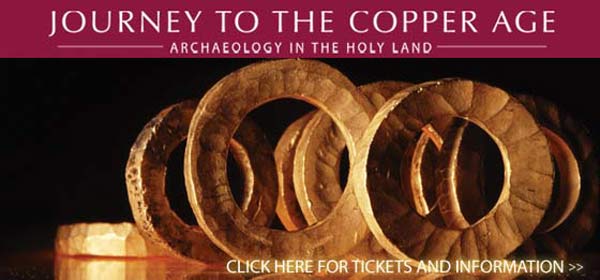

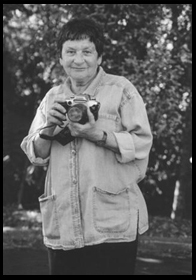 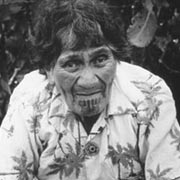 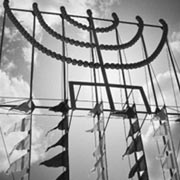
THE JEWISH CITIZEN
Documentary enlarges upon the work of New Zealand photographer Friedlander
By Donald H. Harrison
 SAN DIEGO --An artist discussing the work of New Zealand photographer Marti Friedlander suggests that in almost every picture of hers there are layers of meaning—even, one supposes, as the Torah is said to have at least four levels of meaning: the literal, the implied, the metaphoric, and the hidden. SAN DIEGO --An artist discussing the work of New Zealand photographer Marti Friedlander suggests that in almost every picture of hers there are layers of meaning—even, one supposes, as the Torah is said to have at least four levels of meaning: the literal, the implied, the metaphoric, and the hidden.
 Unless one has an exceptionally keen eye, watching the 2004 documentary Marti: The Passionate Eye at the 18th Unless one has an exceptionally keen eye, watching the 2004 documentary Marti: The Passionate Eye at the 18th
Donald H. Harrison
Annual San Diego Jewish Film Festival is likely to be a 72-minute experience in only the first level of meaning. Viewers who attend the 1 p.m., Sunday, Feb. 10, presentation at the AMC La Jolla will hear the story of Friedlander’s childhood in a Jewish orphanage and as a photographer’s assistant in London, and learn of her metamorphosis into a photographer of the first rank in New Zealand.
Although there are numerous photographs of Friedlander’s within the documentary directed by Shirley Horrocks, there is insufficient time to really linger over any one of them. So there may not be time to find those other levels of meaning. Before you can fully consider the composition of one photograph, another one is presented. That may be the advantage of a home video or DVD, with a remote equipped with a pause button, over a full screen movie house presentation.
There is an interesting if contradictory discussion about Friedlander’s work. She is said to take charge of her photos by sizing up her subjects quickly, deciding who they are, and then having them pose to suit her concept. A Friedlander portrait of someone else more often than not is as much a portrait of Friedlander, even though she remains behind the camera.
For all the control that she exercises, one of her best known photographs was impromptu. Along a road, she encountered a herd of sheep. Usually if someone tries to photograph the animals, one or two of them will turn away, providing a hind quarters shot. Or perhaps the herd will separate, creating a gap in the front of the photograph. However, in this shot, all the sheep stood looking at the camera, as if they were posing, with the dust they had stirred up forming a backdrop It has become an iconic photograph of New Zealand, and it was one over which Friedlander really had no control, only well-honed instincts to recognize and to capitalize on a wonderful image as it materialized in front of her.
As painters go though periods, so too did Friedlander have her photographic periods. At first she enjoyed doing portraits of children interacting with their parents or siblings. Typical of these photographs were one of a father holding by her ankles a girl in a bathing suit, so she seemed ready to make a perfect-10 Olympic dive. Another had a father waiting to catch his young son after tossing him in the air. Other photos showed children with sad faces—perhaps they had been told they could eat no more dessert.
Friedlander subsequently went on tour of New Zealand, shooting those scenes that might have been ignored as nothing out of the ordinary by a New Zealander. But Friedlander saw rural New Zealand with a British urbanite’s eyes, and she delighted in pictures of ranchers by the hay bales, buyers bidding on sheep at auction, men with their beers at the pub, and women deep in conversation. Some of the photographs perfectly captured scenes and artifacts of New Zealand’s past.
She also appreciated New Zealand’s incredible natural beauty, often taking photos with a foreground, a subject in the near ground, and an interesting background, all framed by a far background. Like all photographers, she loves the play of light—and she likes to juxtapose natural and human shapes.
She and her husband traveled to Israel in the 1960s, and her photographs helped to capture the country when it still was a pioneering society. I liked on image of a haredi in black coat, with a child all in white in front of him. As the haredi’s lower face was covered by a beard, so too was the child’s face obscured by his hand.
Another well-known series of photographs dealt with the indigenous people of New Zealand, the Maoris. In particular, she became fascinated with the chin tattoos (moko) that the pre-modern generation of Maori women wore. One of her favorite photographs, which she posed under during much of the time she was being interviewed within the documentary, showed a large sculpture of two Maori faces, with two elderly women with their chin tattoos sitting in the background.
As often as not, Friedlander felt the urge to demonstrate in behalf of causes, but she constrained herself to be the neutral photographer of social protest. She took photographs of anti-Vietnam War protesters, marchers for women’s liberation, as well as of stern, proper ladies demonstrating for Christian biblical values. Always her photos conveyed the emotion of the protestors.
Another fine series showed New Zealand artists in their studios. Some of them took direction easily, others were nearly as strong-willed as she was when it came to deciding just what image of themselves they wished to present. Nevertheless, what Marti wanted Marti got.
Her husband, Gerrard, was perhaps the least compliant of her photographic subjects. On the other hand, one who did exactly what Friedlander told her to do was Friedlander herself. She was meticulous in recording her own aging process, and would allow no one to formally photograph her but herself.
Friedlander has been invited to attend the showing of the film at the San Diego Jewish Film Festival. There has been no word yet on whether she will be able to make the presentation at which Deborah Klochko, director of San Diego’s Museum of Photographic Arts is scheduled to deliver a commentary.
SAN DIEGO JEWISH WORLD THE WEEK IN REVIEW
Eitan Frysh in San Diego: Frum Jewish director stays out of theatres on Shabbat, chooses only tasteful plays
Peter Garas in Canberra: 25,000 salmon free for the taking has his mouth just watering for fresh bagels
Donald H. Harrison in San Diego: Movie probes after-effects of the Holocaust: Dear Mr. Waldman will screen twice at San Diego Jewish Film Festival
Gabi Maio in San Diego: Teen recounts she was chosen for summer leadership trip to Israel
Dov Burt Levy in Salem, Massachusetts: Readers share opinions on whether we should teach children about the Shoah
Ira Sharkansky in Jerusalem: What about Israeli-on-Israeli violence?
Dorothea Shefer-Vanson in Mevasseret Zion, Israel: A glorious chorus brought in New Year
Tuesday, January 1, 2008 (v2, no. 1)
Peter Garas in Canberra, Australia: Forget the tail of the dog that bit you; now it's the breeze from the air that you heated
Donald H. Harrison in Escondido, California: Dinner and a movie: two fine inter-cultural opportunities
J. Zel Lurie in Delray Beach, Florida: Har Homa once again the monkey wrench in the Middle East peace process
Lynne Thrope in San Diego: Fine restaurants to offer special prix fixe menus during San Diego's 'restaurant week'
MONDAY, DECEMBER 31
Shoshana Bryen in Washington, D.C.: Turkey and U.S. join to fight Kurdish terror
Donald H. Harrison in Los Angeles: Animals stand in for people at Skirball's imaginative, interactive Noah's Ark exhibit
Sheila Orysiek in San Diego: I am resolving to be more resolute
< BACK TO TOP
|

